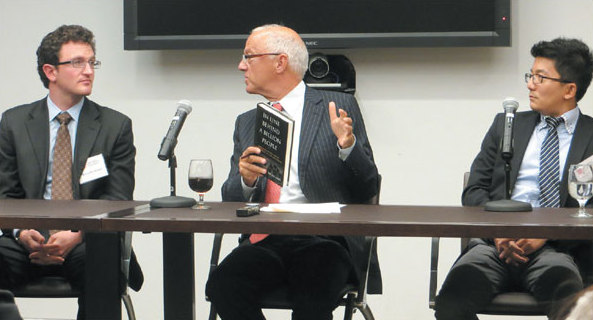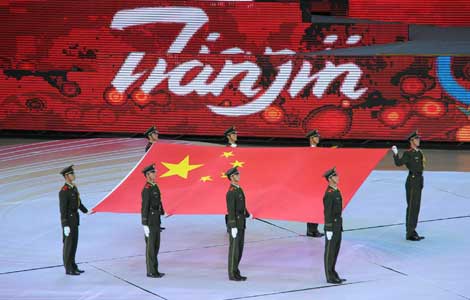New book is optimistic on outlook for China
Updated: 2013-10-07 11:08
By Caroline Berg in New York (China Daily)
|
||||||||
Despite scarcity challenges that China will face over the next decade, two authors in their recently published book, In Line Behind a Billion People: How Scarcity Will Define China's Ascent in the Next Decade, give the government a 70 percent chance of "getting it right".
Authors Damien Ma and William Adams write that after 35 years of skyrocketing economic growth, China's future will be shaped by the same fundamental reality that has shaped it for millennia: scarcity.
"China still has a sort of 20th century political system that is trying to deal with 21st century problems," said Ma during a book discussion held on Thursday by the National Committee on US-China Relations (NCUSCR). "For the last three decades, the system didn't need to be so sophisticated in managing society, but now I think it needs to be a lot more sophisticated."
The book delves into China's scarcity issues beyond natural resources and public goods, and highlights what the authors say is the nation's everlasting lack of individual freedoms, cultural appeal and ideological legitimacy, as well as the corrosive loss of values and beliefs among a growing middle class trapped by a strict political system.
|
Author William Adams (left), President of the National Committee on US-China Relations Stephen Orlins (center), and author Damien Ma, came together Thursday night in New York to discuss their book, In Line Behind a Billion People: How Scarcity Will Define China's Ascent in the Next Decade. Caroline Berg / China Daily |
"China still has a sort of 20th century political system that is trying to deal with 21st century problems," said Ma, who is a fellow at the Paulson Institute think tank for promoting sustainable economic growth and environmental preservation in the US and China. "For the last three decades, the system didn't need to be so sophisticated in managing society, but now I think it needs to be a lot more sophisticated."
The book discussion's moderator, NCUSCR president Stephen Orlins, noted that it was a funny day to discuss the book about what the Chinese government is confronted with and what it should do in order to reform.
"This [program] is of course on a day when the US government is closed," Orlins said and drew some laughs. "It's always a little odd to sit there and say, 'Well, will the Chinese be able to deal with this?' when I think about our government and say, 'Clearly, we are not able to deal.' "
The authors said their book seeks to go beyond the cheerleading and fear mongering that pervade so many China analyses, and, instead, strives to present a more accurate representation of China.
"If you look at some of the challenges China faced in the '50s, '60s, post-Mao, and even during Deng Xiaoping, it's hard for us to say that those problems were any less severe than they are now," Ma said. "We came down on the more optimistic side that the system is still capable of embracing change, and it's going to be able to manage."
Adams, who is an assistant vice-president and senior international economist for the PNC Financial Group, said that although China's scarcity issues are immense, the Chinese government has historically beaten expectations in managing the "very, very challenging" issues that are in front of them.
"I think the key thing is fundamentally on the institutional side where they're going to have to become more efficient," Ma said. "To do that, they're going to have to deal with the state sector, which is a legacy of unfinished reforms from the '90s."
Ma said he has seen positive signs, including the recent crackdown on corruption within the Chinese government.
"They've been targeting some pretty significant 'sacred cows' in the state sector," Ma said. "I think we can tentatively say that this is not just an anti-corruption campaign alone. I think this is more of an economic and political move to make some room to start changing [the system]."
Adams said China's economic development has created new political issues that will circle back and influence future economic development. He said economic development has also changed Chinese society, making the youth much more cosmopolitan and aware of what other people their age are thinking and discussing. Adams said this will influence the constraints and policy options available to the government.
"I think there's more of a sense of urgency to really deal with [China's problems]," Ma said about the Chinese government. "There won't be a one-size-fits-all solution."
carolineberg@chinadailyusa.com
(China Daily USA 10/07/2013 page1)
Most Viewed
Editor's Picks

|

|

|

|

|

|
Today's Top News
Academics evaluate China at conference
Experts examine core values of China, US
China needs to export ‘public goods’: expert
Sowing the seeds of new business
Chinese investors visit Silicon Valley
Two Chinese die in plane crash near Saipan
Destroying Syria's gas arms started
Direction charted to resolve disputes
US Weekly

|

|















